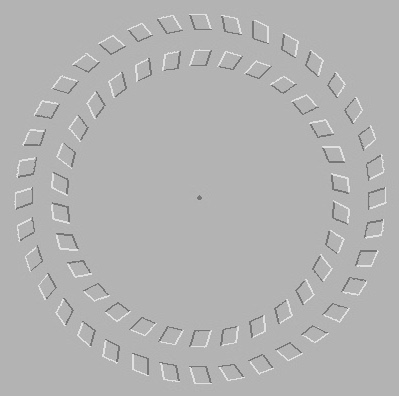Lesson 5: Sensation and Perception
Attention
People often say, “Your perception is your own personal reality,” but what does that really mean? Is perception a realistic reflection of the truth (objectively speaking) or is it simply an illusion?

OK...as you are sitting at your computer looking at this image focus your vision on the spot in the middle
Move your face toward the screen and then away from the screen keeping your eyes on the spot in the middle
Notice anything??!!
This lesson will challenge you to re-think the relationship between perception and reality by explaining core concepts such as stimulus, sensation and something called “Gestalt Psychology.”
Click HERE to link to this video directly on YouTube
In this video the narrator relates that when we are in the world we use a lot of assumptions to make sense of what is around us. These assumptions are highly influenced by factors such as our culture, gender, upbringing, and recent experiences.
We make errors in perception because we make assumptions about the real world and how it works. This video demonstrates the "Ames Room" which is a room that is totally distorted in shape, but when viewed from a specific vantage point the room looks "normal"...we are then susceptible to some illusions that will definitely grow on you!
Have fun with all of this!
Learning Outcomes
Upon completion of this lesson's material, students will be able to:
- Distinguish between sensation and perception.
- Describe the concepts of absolute threshold and difference threshold
- Discuss the roles attention, motivation, expectations, and bias have on perception.
Teaching
Three Concepts regarding Sensation
Transduction
This is the process of changing physical energy (light waves, sound waves)
into neurological data. The sense organs (eyes, skin, etc.) are adapted
to do this
Reduction
We cannot take in all the information that comes at us at a time. We reduce
this information in two ways...Attention (which is one of the processes
in Perception by which we select which stimuli to attend to) and Sensory
Limits (actual limitations on what our sense organs can pick up on, such
as our eyes inability to pick up infrared light).
Habituation
Consider what we experience when we get up in the morning and put on our socks. At first we are very aware of the socks but in very little time we are distracted and we forget about them (until we step into a puddle). This "habituation" happens both on the cognitive level in terms of our awareness and what we attend to and on the neurological level where consistent unchanging stimuli no longer elicit nerve impulses.
Sensation vs. Perception
Sensation is simply the bits of information we gather...perception is the process whereby we put all the pieces together to form meaning.
Culture
- What impact do you think your own culture has had on the assumptions you make?
- Consider these factors:
- The type of house you live in
- what do you consider "roughing it"?
- What kind of food do you eat
- would you find ants or grasshoppers a yummy treat? (http://www.ca.uky.edu/entomology/dept/bugfood2.asp)
- What colors do you like
- some colors do not even occur in the natural world
- What would you consider musical and pleasant
- The type of house you live in
Assessment
In this section you will find a list of the required Assessments that accompany this Lesson. The Lesson Discussions are designed for the ONLINE and HYBRID versions of this course. If you are not in an ONLINE or HYBRID version of this course you can ignore these instructions unless otherwise guided by your instructor.
Lesson 5 Discussion
Discuss the roles attention, motivation, expectations, and bias have on perception. Provide examples as to how you have experienced things in the world that have been impacted by your attention to specific details, your motivations, your expectations within the circumstances, and your bias.
Lesson 5 Quiz
- Compare and contrast the concepts of "sensation" and "perception".
- Describe the difference between "absolute threshold" and "difference threshold".